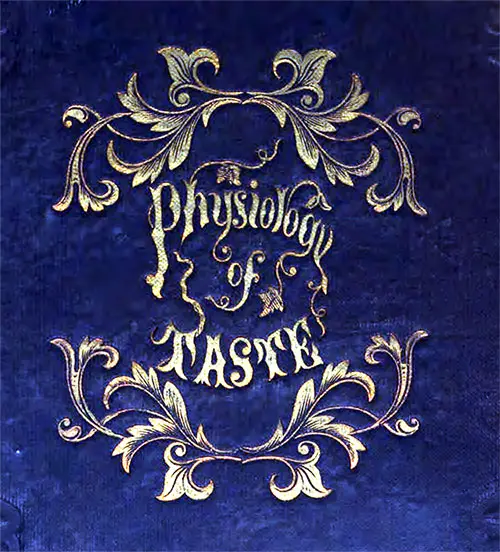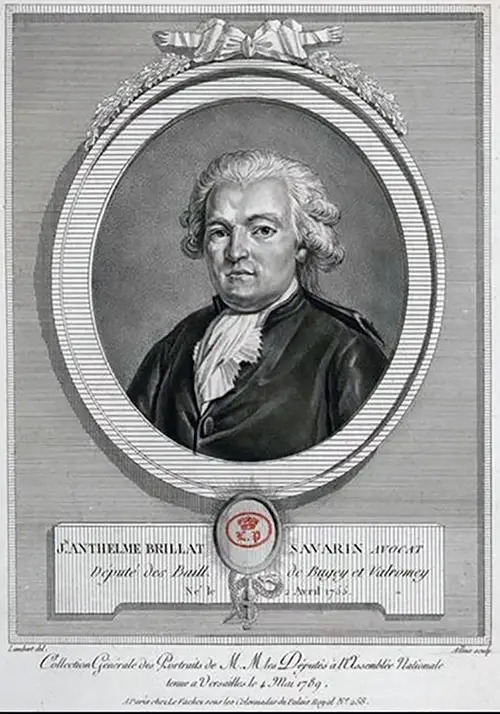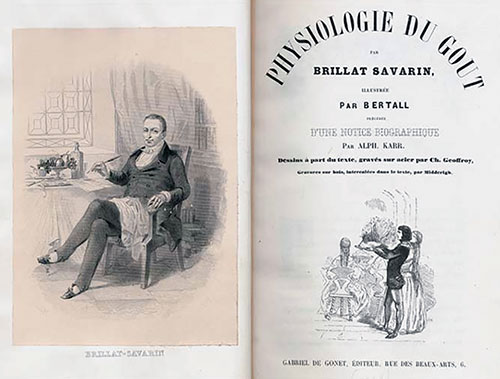The Physiology of Taste - 1854

By Brillat Savarin
Jean Anthelme Brillat-Savarin, Counsel of the Court of Cassation, was born on 1st of April, 1755, at Belley, a little Alpine city, not far from the banks of the Rhine, which at this place separates France from Savoy.
Like his forefathers, who had been for several generations devoted to the bar, the profession which pleased him, in consequence of his possession of great eloquence, he practiced with great success.
Less attached in practice to the philosophy of Zeno than that of Epicurus, his name does not figure very conspicuously, but always appears at epochs, which show that he acted with the good and moderate.
In 1793, he was Mayor of Belley, and passed in anxiety there, the season of the reign of Terror; whence he was forced to fly to Switzerland for an asylum against the revolutionary movement.
Nothing can better describe the evil of those days than that a man, without a personal enemy, should be forced to pass in a foreign land the days he purposed to devote to the improvement of his country.
So, he came from Europe to Boston, New York, Philadelphia, and Hartford and passed two years teaching the French language, and for a time playing the first violin in the orchestra of the Park Theatre.
However, Brillat Savarin returned to France as he fancied that he will see brighter days with the commencement of Vendemiaire Year 5, corresponding to September of 1796.
He spent the remaining twenty-five years of his life respected by his inferiors, loved by his equals, and honored by all. A man of mind, a pleasant guest, with a deep fund of humor, he delighted everybody.
Savarin was naturally a thoughtful man, and an epicure. The simplest meal satisfied him, for all that he required was that it should be prepared artistically; and he maintained that the art of cookery consisted in exciting the taste.
He used to say, " to excite a stomach of Papier Mache, and enliven vital powers almost ready to depart, a cook needs more talent than he who has solved the infinitesimal calculus.
Below is an excerpt of Brillat-Savarin’s Gastronomical Observations through his writing and meditations. His book Physiologie du Gout is a masterpiece.

Aphorisms of the Professor
- The universe would be nothing were it not for life, and all that lives must be fed.
- Animals fill themselves; man eats. The man of mind alone knows how to eat.
- The destiny of nations depends on the manner in which they are fed.
- Tell me what kind of food you eat, and I will tell you what kind of man you are.
- The Creator, when he obliges man to eat, invites him to do so by appetite, and rewards him by pleasure.
- Gourmandise is an act of our judgment, in obedience to which, we grant a preference to things which are agreeable, over those which have not that quality.
- The pleasure of the table belongs to all ages, to all conditions, to all countries, and to all eras ; it mingles with all other pleasures and remains at last to console us for their departure.
- The table is the only place where one does not suffer from ennui, during the first hour.
- The discovery of a new dish confers more happiness on humanity, than the discovery of a new star.
- Those persons who suffer from indigestion, or who become drunk, are utterly ignorant of the true principles of eating and drinking.
- The order of food is from the most substantial to the lightest.
- The order of drinking is from the mildest to the most foamy and perfumed.
- To say that we should not change our drinks is a heresy ; the tongue becomes saturated, and after the third glass yields but an obtuse sensation.
- A dessert without cheese is like a beautiful woman who has lost an eye.
- A cook may be taught, but a man who can roast, is born with the faculty.
- The most indispensable quality of a good cook is promptness. It should also be that of the guests.
- To wait too long for a dilatory guest, shows disrespect to those who are punctual.
- He who receives friends and pays no attention to the repast prepared for them, is not fit to have friends.
- The mistress of the house should always be certain that the coffee be excellent ; the master that his liquors be of the first quality.
- To invite a person to your house is to take charge of his happiness as long as he be beneath your roof.

On Taste
Of all the senses with which we have been endowed by nature, the taste is the one, which all things considered, procures us the most enjoyments:
- Because the pleasure of eating is the only one, when moderately enjoyed, not followed by fatigue.
- It belongs to all eras, ages and ranks.
- Because it necessarily returns once a day and may without inconvenience be twice or thrice repeated in the same day.
- It mingles with all other pleasures, and even consoles us for their absence.
- Because the impressions it receives are durable and dependent on our will.
- Because when we eat, we receive a certain indefinable and peculiar impression of happiness originating in instinctive conscience. When we eat, we repair our losses and prolong our lives.
On Gourmandise
Gourmandise is a passionate preference, well determined and satisfied, for objects which flatter our taste.
Gourmandise also comprehends, friandise (passion for light delicacies) for pastry, confitures, etc. This is a modification introduced for the special benefit of women, and men like the other sex.
Physically, it is a demonstration of the healthy state of the organs of nutrition.
Morally, it is implicit resignation to the orders of God, who made us eat to live, invites us to do so by appetite, sustains us by flavor, and rewards us by pleasure.
When gourmandise becomes gluttony, voracity or debauchery, it loses its name and attributes, falling into the hands of the moralist who will treat it by advice, or the medical man who will treat it by remedy.
On the Pleasures of the Table
The pleasure of eating is a peculiar sensation directed to the satisfaction of a necessity.
The pleasures of the table is a reflected sensation, originating in various facts, places, things and persons.
The pleasures of the table afford neither ravishing pleasure, ecstasy, nor transport, but it gains in intensity what it loses in duration. It is the more valuable because it exposes us to all other gratifications and even consoles us for their loss.
After a good dinner body and soul enjoy a peculiar happiness. Physically, as the brain becomes refreshed, the face lightens up, the colors become heightened, and a glow spreads over the whole system. Morally, the mind becomes sharpened, witticisms circulate.
Brillat Savarin, The Physiology of Taste; or Transcendental Gastronomy, Translated from the French Physiologie du Gout by Fayette Robinson, Philadelphia: Lindsay & Blakiston, 1854. Additional Edits by E. Blanc Gjenvick, 2019.
